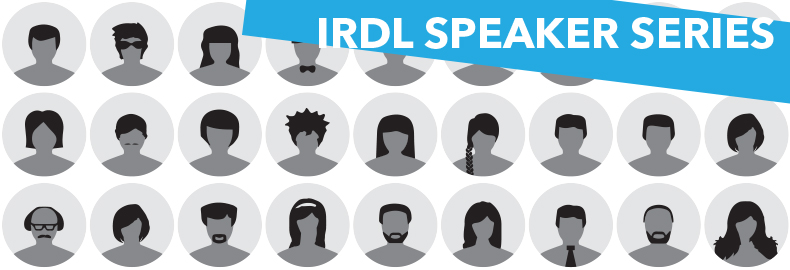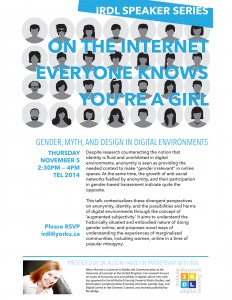TEL Building
room 2014
It has largely become passé to use the language of ‘the real world’ and ‘online life’ to distinguish between our interactions and practices in and outside digital environments as our everyday personal and working lives become more networked (Baym, 2010). However, despite research counteracting the notion that identity is fluid and uninhibited in digital environments (Nakamura, 2000), anonymity in online spaces is seen as providing the needed context to make “gender irrelevant” (de Pillis & Furomo, 2007, p.2). At the same time, the growth of anti-social networks on platforms such as 4chan and Reddit fuelled by anonymity, and their participation in gender-based harassment exemplified by the 2014-2015 Gamergate controversy, indicate quite the opposite (Massanari, 2015).
This talk contextualizes these divergent perspectives on anonymity, identity, and the possibilities and harms of digital environments through the concept of ‘augmented subjectivity’ (Rey & Boesel, 2014). It aims to understand the historically situated and embodied nature of doing gender online through a return to the origins of the design of online environments, engaging with the relationship between California ideology, libertarianism, misogyny, and digital culture. Through this engagement with the historical roots of online subjectivity, foundational myths regarding networked sociality, and designed anonymity, it proposes novel ways of understanding the experiences of marginalized communities including women online in a time of popular misogyny (Banet-Weiser, 2015).
Works Cited
Banet-Weiser, S. (2015). “Popular Misogyny: A Zeitgeist.” Culture Digitally http://culturedigitally.org/author/sarah-banet-weiser/
Baym, N. (2010). Personal Connections in the Digital Age. Cambridge, UK: Polity Press.
de Pillis, E. & Furumo, K. (2007). “On the Internet, Nobody Knows You’re a Girl: The Female Performance Advantage in Anonymous Virtual Teams.” Journal of International Business and Economy, 8(2), pp. 35-47.
Massanari, A. (2015). “MRA’s, #gamergate, and TheFappening: How Reddit’s Algorithm, Community and Culture Enables Toxic Technocultures.” Presented at Console-ing Passions, Dublin, Ireland, June 18-20, 2015.
Nakamura, L. (2000.) “Race In/For Cyberspace: Identity Tourism on the Internet.” The Cybercultures Reader. Eds. Barbara M. Kennedy & Daniel Bell. London and New York: Routledge Press, 712-720.
Rey, PJ & Boesel, W.E. (2014). “The Web, Digital Prostheses, and Augmented Subjectivity.” Routledge Handbook of Science, Technology and Society. Eds. Daniel Lee Kleinman & Kelly Moore. New York: Routledge, 173-186.

Alison Harvey is a Lecturer in Media and Communication at the University of Leicester in the United Kingdom. Her research focuses on issues of inclusivity and accessibility in digital culture. Her work has appeared in Social Media & Society, Feminist Media Studies, and Information, Communication & Society. Her book, Gender, Age, and Digital Games in the Domestic Context, was recently published by Routledge.





